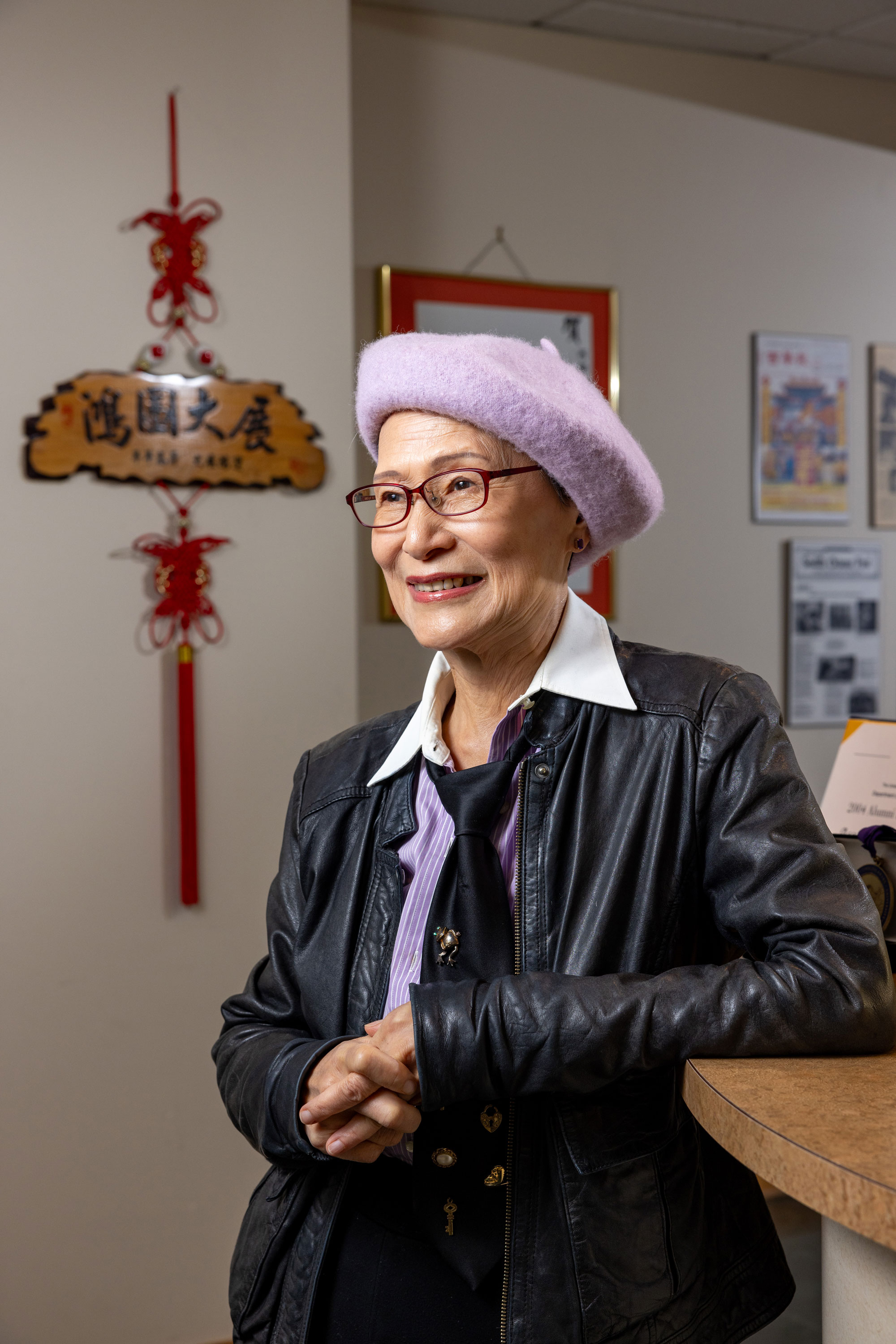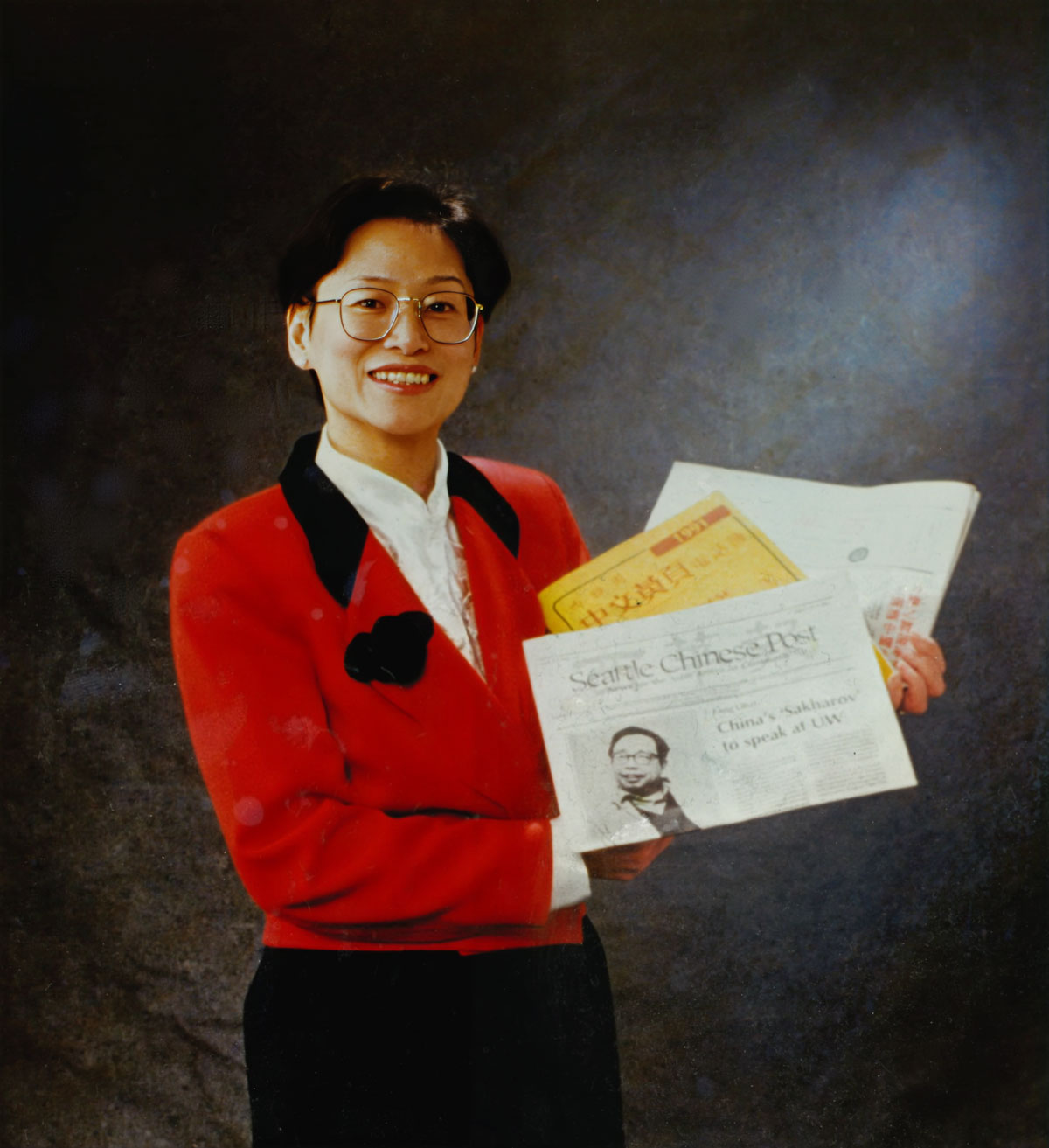Read all about it Read all about it Read all about it
Newspaper founder Assunta Ng passes her empire to a new generation of community-minded UW alumni.
By Shin Yu Pai | Photos by Matt Hagen | December 2024

When her husband, George Liu, was diagnosed with cancer during the COVID-19 pandemic, Assunta Ng, ’74, ’76, ’79, knew something had to give. Adding her partner’s operational duties for the publications to her own responsibilities as newspaper publisher, she found it impossible to balance her time with being his caregiver. So in 2023, she discontinued the print editions of the Seattle Chinese Post and Northwest Asian Weekly—two beloved community-based newspapers that she had produced weekly for more than 40 years.
Over the decades, Ng faced a number of wide-ranging challenges in producing the paper. “One day, the printer might say, ‘My machine broke down, and we can’t handle how many color pages you need,’” she says. Ng would have to notify her advertisers and promise to make it up to them in the next issue. Broken machines meant paper delivery would be delayed. Ng would have to call the distributors and still pay them for their time. She even served as a part of the delivery system for the papers, refilling news boxes in the Chinatown-International District. “When the print versions were shut down, I didn’t have to take care of these little things anymore,” she says.
But the community reaction was strong. “People cried,” says Ng. “When they received the paper, it was like hearing from a good friend. And when it stopped, the friend didn’t come by to say hi anymore.” Ng describes the Chinese Post as a Chinese-language publication that provided “weekly spiritual guidance.” The paper covered news in the neighborhood, the nation and the world, with coverage spanning Hong Kong, Taiwan and China. “When we sent out the refunds for the subscribers, people said there was not enough notice,” she says. “They thought we’d go on forever.”
The paper’s content gave readers a common ground to engage with their neighbors and develop a political perspective. “[Losing the print edition] was very damaging to the community,” Ng says. “We were the only one to also talk about Seattle and American politics. The other papers didn’t do that.” But it served more practical purposes, too. The Chinese Post had a significant classified ad section, publishing between 100 and 150 ads each week. “Many immigrants told us they found jobs through our inexpensive classified sections,” Ng says. “Small businesses found their clients through little ads. We built up our community’s economic power through the classifieds.”

In 1982, Ng founded Seattle Chinese Post with $25,000 of her own seed money. A year later, she founded Northwest Asian Weekly, a Pan-Asian publication written in English.
During the pandemic, Ng thought seriously about selling the business, but wasn’t sure how to go about it. “I didn’t want to let people know that I wanted to sell it because it would affect our image,” she says. “I kept quiet, hoping that someone would come to me.” The perfect buyer came forward in Jeff Roh, ’93, ’16, who formed a partnership with his wife, Grace (Shin) Roh, ’94, Sam Cho and Tim Wang, ’12.
In February 2023, Roh approached Ng to ask about her plans with the Northwest Asian Weekly website. He had thought about buying it after hearing community members express their loss with the end of the print versions of the Chinese Post and Northwest Asian Weekly. “He went out and talked to three potential buyers,” Ng says. In Roh’s mind, those specific partners would make a great team. Ng was thrilled to learn that Sam Cho, who serves as commissioner for the Port of Seattle, was one. Later, readers would be thrilled as well.
“I started to discreetly ask respected leaders of the community for their thoughts around the Northwest Asian Weekly and whether they felt a locally owned AAPI [Asian American Pacific Islander] newspaper was still relevant and necessary,” Cho says. “The response I got was overwhelmingly affirmative. It convinced me to pursue this venture with my partners. After the COVID-19 pandemic, it is imperative for the AAPI community to have a steady voice. We can’t depend on viral moments to be heard and taken seriously. That’s why the Northwest Asian Weekly is so critical.”
The paper helped readers recognize injustice and to fight back as a community and encourage people to run for office.
“We owe a huge debt of gratitude to Assunta,” Grace Roh says. “Thanks to her commitment and advocacy for over four decades, the greater Seattle community has relied on Northwest Asian Weekly as a leading local source for AAPI news. Out of a passion to preserve its legacy, we will continue to provide a platform to bring awareness to AAPI issues, stories and perspectives that may otherwise go unheard.”
With the newspapers now in steady hands, Ng is taking a break from journalism to explore new interests. She has helped campaign and fundraise for several political candidates and is committed to making Asian Americans visible and empowering them to run for office. “When I first started, there were few Asian Americans in decision-making positions and few in elected officials,” Ng says. “Today, the number of Asian Americans running for office has multiplied. They aren’t afraid of running for office anymore.”
She also recently developed several endowments and funds at the UW, including scholarship awards administered through the Evans School of Public Policy & Governance, Foster School of Business, College of Education and Department of Communication. She also set up funding for the Asian Languages and Literatures programs to support student trips and guest lectures. Ng’s long history of support at the UW includes serving as a voluntary mentor to Foster School undergraduates for the past 20 years through the Rotary Club’s mentorship program.
Ng’s formative experiences as a UW student included working at The Daily and taking journalism classes that would inform her eventual work as a publisher. She studied communications while teaching at a junior high school. “I started the Chinese Post because of my work as a social studies teacher,” Ng says. “I worked with a lot of immigrant families. I understood what the parents and the students were going through. I wanted to have the Chinese-language paper to help the parents. Later, I started the Northwest Asian Weekly because the American-born children complained they couldn’t understand a damn thing and they wanted to know what their parents were reading.”
Ng saw the Northwest Asian Weekly as a tool for liberation and political empowerment in the face of social injustice and racism. “The paper was to help readers recognize injustice and to fight back as a community and encourage people to run for office,” Ng says. The newspapers also organized workshops bringing Asian and Black leaders together. “We as a community have much to learn from the Black community,” Ng says. “We can learn from others and build coalitions and share strategies to work for our community and rise. The Asian community has a lot to learn. We are so afraid. All these things in America, you deserve them as much as the person next to you.”
When Ng started the newspapers, people told her she wouldn’t be successful. One family friend, upon hearing there were only about 10,000 Chinese immigrants in the community, told her she wasn’t dreaming big enough for her business. “He meant, ‘you are not going to make a lot of money,’” she says. “I don’t know if my dream was big or small,” but with two newspapers that at peak circulation reached about 26,000 people and eventually owning a building to house the business, “we were bigger than we ever dreamed.”